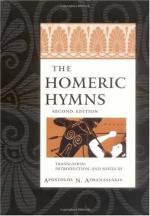So spake she, but Leto swore the great oath of the Gods:
“Bear witness, Earth, and the wide heaven above, and dropping water of Styx—the greatest oath and the most dread among the blessed Gods—that verily here shall ever be the fragrant altar and the portion of Apollo, and thee will he honour above all.”
When she had sworn and done that oath, then Delos was glad in the birth of the Archer Prince. But Leto, for nine days and nine nights continually was pierced with pangs of child-birth beyond all hope. With her were all the Goddesses, the goodliest, Dione and Rheia, and Ichnaean Themis, and Amphitrite of the moaning sea, and the other deathless ones—save white-armed Hera. Alone she wotted not of it, Eilithyia, the helper in difficult travail. For she sat on the crest of Olympus beneath the golden clouds, by the wile of white-armed Hera, who held her afar in jealous grudge, because even then fair-tressed Leto was about bearing her strong and noble son.
But the Goddesses sent forth Iris from the fair-stablished isle, to bring Eilithyia, promising her a great necklet, golden with amber studs, nine cubits long. Iris they bade to call Eilithyia apart from white-armed Hera, lest even then the words of Hera might turn her from her going. But wind-footed swift Iris heard, and fleeted forth, and swiftly she devoured the space between. So soon as she came to steep Olympus, the dwelling of the Gods, she called forth Eilithyia from hall to door, and spake winged words, even all that the Goddesses of Olympian mansions had bidden her. Thereby she won the heart in Eilithyia’s breast, and forth they fared, like timid wild doves in their going.
Even when Eilithyia, the helper in sore travailing, set foot in Delos, then labour took hold on Leto, and a passion to bring to the birth. Around a palm tree she cast her arms, and set her knees on the soft meadow, while earth beneath smiled, and forth leaped the babe to light, and all the Goddesses raised a cry. Then, great Phoebus, the Goddesses washed thee in fair water, holy and purely, and wound thee in white swaddling bands, delicate, new woven, with a golden girdle round thee. Nor did his mother suckle Apollo the golden-sworded, but Themis with immortal hands first touched his lips with nectar and sweet ambrosia, while Leto rejoiced, in that she had borne her strong son, the bearer of the bow.
Then Phoebus, as soon as thou hadst tasted the food of Paradise, the golden bands were not proof against thy pantings, nor bonds could bind thee, but all their ends were loosened. Straightway among the Goddesses spoke Phoebus Apollo: “Mine be the dear lyre and bended bow, and I will utter to men the unerring counsel of Zeus.”




